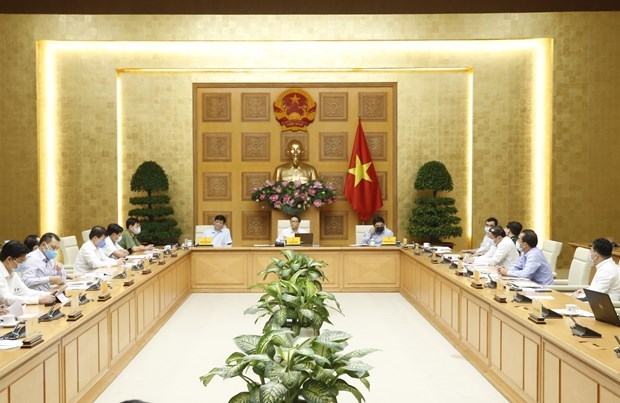Covid-19 outbreak in Da Nang, Quang Nam to be under control by late August: Official
The spread of COVID-19 in Da Nang and Quang Nam Province has been gradually contained and the situation is expected to be under control by late August, according to Acting Minister of Health Nguyen Thanh Long.
 |
| Deputy Prime Minister Vuc Duc Dam chairs the meeting. (Photo: VNA) |
At a meeting of the national steering committee for COVID-19 prevention and control in Ha Noi on 18 August, Long said the number of new infections in Da Nang and Quang Nam has fallen in recent days, from an average of 20 cases a day from 3 to 9 August to about 10 cases from 10 to 17 August .
New hotspots may still appear nationwide, he warned, and he demanded that all localities remain on high alert to detect new cases in a timely manner, as the sooner infections are found the more effective efforts to stamp out the disease will be.
He pointed out that although experts have issued strong warnings, people are not sufficiently vigilant against transmission.
He called for dramatic solutions to slow down and limit transmissions, calling on all people to install the Bluezone contact tracing app and the NCOVI health declaration app on their smartphones.
Regarding the development of a vaccine, Tran Dac Phu, advisor to Viet Nam’s public health emergency operations centre, said many countries have conducted COVID-19 vaccine tests on animals before conducting human trials.
If vaccines used in other countries are imported, Viet Nam will not test them on animals but will do so on humans to ensure their effectiveness and safety. This process often lasts between six months and a year or even several years before widespread vaccinations, he noted.
Before effective vaccines or specialised medicine are available, people must remain on guard for a long period of time in a spirit of “safely adapting to the pandemic”, experts have urged.
They also proposed warning levels for COVID-19 be raised, especially in major cities and populous regions, while protecting medical facilities, retirement homes, and social protection centres, as well as frontline forces, from transmission.
Members of the steering committee asked the Ministry of Health to continue enhancing testing capacity and requested that localities strictly quarantine the more than 100,000 foreign experts and workers entering the country.
Asking for more technical solutions to trace high-risk people, they said that aside from encouraging people to use Bluezone and NCOVI, it is also necessary to make it compulsory for foreigners entering Viet Nam or those with second- or third-hand contact with confirmed cases to install these apps.
Source: VNA